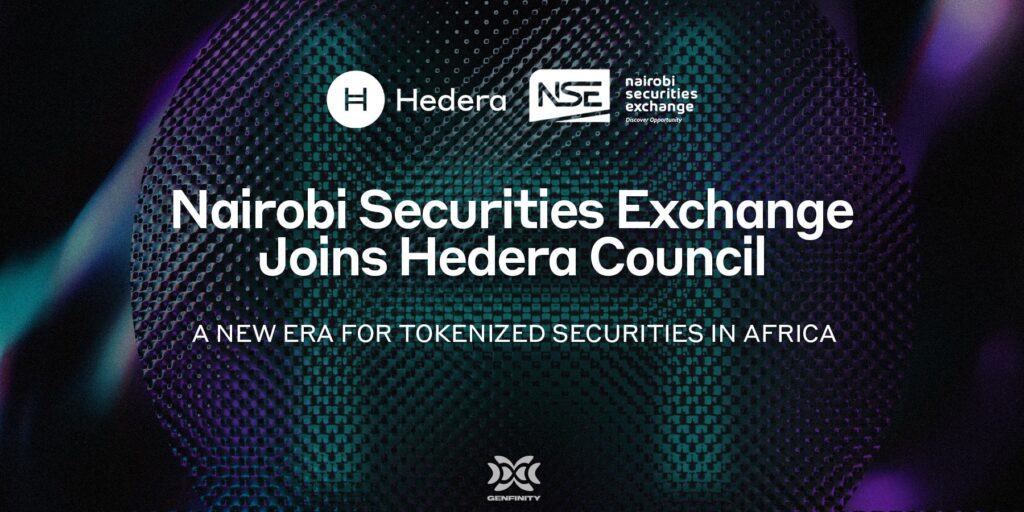-
NSE’s Hedera Council membership enables Kenya to advance in digital asset tokenization, bringing blockchain-based financial innovation to the continent.
-
Tokenization provides increased liquidity and access, allowing fractional ownership and expanded investment opportunities in sectors such as real estate and agriculture.
-
Tokenization may reduce intermediaries and speed up transactions, fostering financial inclusion and economic growth in Kenya.
Nairobi Securities Exchange (NSE) made headlines after they introduced their Hedera Council membership- marking a significant leap forward for digital asset tokenization across Africa. As one of 32 participants in this renowned council, NSE will perform nodes and participate in governance along with enterprise giants like Google and IBM.
By joining the Hedera ecosystem, NSE hopes to improve infrastructure for financial products via the power of tokenization. This generally converts conventional securities into digital tokens on the blockchain, offering greater liquidity and broader investor access.
NSE has finally carved its place within the Web3 community across Africa. This could have extreme ramifications – probably making Kenya an epicenter for financial innovation – while drawing global buyers interested in emerging markets specializing in digitized property.
Overall, its presence in such an influential council marks a dramatic alternative to adopting technological answers throughout financial systems on the continent.
The Nairobi Securities Exchange and Digital Asset Tokenization: Paving the Way for Financial Innovation in Kenya
Digital asset Tokenization, in layman’s language, is the conversion of ownership of real-world assets into tradable digital tokens. This grants users access to fractional possession, multiplied liquidity, and a more comprehensive right of entry to investments. DAT gives Kenya, where financial inclusion remains a challenge, the possibility of revolutionizing traditional monetary merchandise with this modern solution.
The Hedera Council serves as a governing frame charged with placing requirements and enhancing governance in the realm of virtual property. By welcoming NSE as a member, Hedera profits get entry to nearby information that may form regulations and practices surrounding virtual asset tokenization in Kenya – an instance of various stakeholders coming collectively to foster surroundings conducive for increase.
Also, Read Kenya’s $500 Million GBS Market: The AI Revolution You Can’t Afford to Miss!
Tokenization Initiatives at NSE
Nairobi Securities Exchange’s membership with Hedera allows them to convert their services by using integrating virtual asset tokenization. CEO Frank Mwiti notes this aligns perfectly with their intention of providing high-class market infrastructure through innovative financial products.
In addition, by taking advantage of the Hedera community’s security and performance, NSE stands equipped to lead in growing new investment opportunities.

NSE serves a vital purpose that transcends mere trades; it assists organizations all through Kenya with financial savings, investments, and capital access for businesses country-wide.
This is accompanied by enhancing savings, assets, and right of entry to capital markets. Recognized for their strong performance via Morgan Stanley Capital International (MSCI), projects implemented by using NSE need investor trust.
Digital asset tokenization may want to facilitate quicker transactions, even as it reduces the entry obstacles for those searching for exposure to diverse financial products.
How Does Tokenization Work in Securities?
Understanding how tokenization works in securities is paramount for every trader and crypto enthusiast. At its core, digital asset tokenization includes converting physical assets, stocks, or bonds into virtual representations recorded on blockchain structures.
This process guarantees enhanced transparency by recording all transactions related to an asset in a single central location. This streamlines trading by getting rid of intermediaries and speeding transaction rates.
As digital assets gain prominence there, stakeholders have to examine whether tokenized improvements are profitable inside local regulations and market needs earlier than investing.
Ultimately, tokenization’s inclusion within securities holds splendid promise to revolutionize financial services while broadening access to funding opportunities for absolutely everyone.
Opportunities and Challenges Presented by Digital Assets
Kenya stands proud as a rising hub of digital asset innovation throughout Africa. Hedera’s Bill Miller stresses the need to leverage NSE understanding as this will extensively enhance adoption charges amongst Kenyan traders. In addition, the integration of such technology might also provide several potential advantages throughout sectors, including actual estate and agriculture.
Although digital asset tokenization could offer many blessings, several boundaries exist. A prime example is the regulatory uncertainties; without clean frameworks governing new financial products, investors, traders, and even enthusiasts take a step back. Furthermore, cybersecurity risks must be controlled proactively with the use of technological answers.
Adopting digital asset tokenization represents a street toward economic transformation across African economies.
Through extended entry into the price range and improved transparency measures, international locations can use this generation correctly – case studies from different areas screen its practical consequences in riding elevated economic interest and prosperity.
Conclusion
In summary, the Nairobi Securities Exchange’s move towards embracing digital asset tokenization marks a significant milestone not just for Kenya but potentially all African nations. Thus, they are looking toward modernization efforts within their respective economies through innovative financial products underpinned by secure infrastructures such as those provided by networks like Hedera as collaborative efforts continue between key players.
This also includes those engaged actively through platforms like Web3Africa—the long-term impacts promise great strides forward, integrating cutting-edge technologies into established systems while nurturing entrepreneurial spirit among local innovators eager to seize upon these transformative opportunities ahead!
